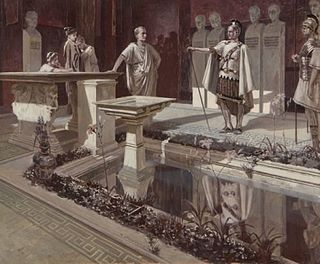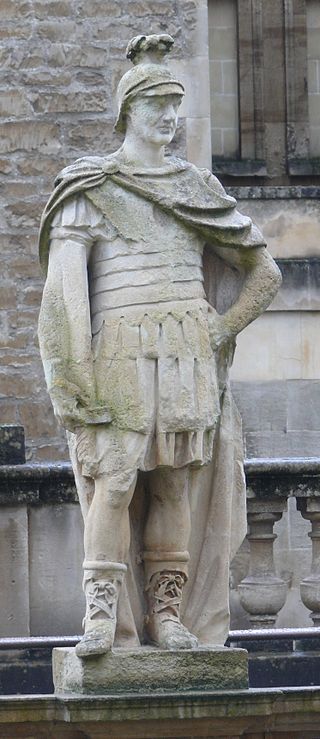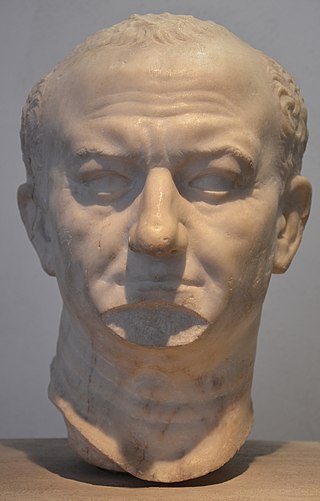Related Research Articles

The 60s decade ran from January 1, AD 60, to December 31, AD 69.

Gaius Suetonius Paulinus was a Roman general best known as the commander who defeated the rebellion of Boudica.

The gens Petronia was a plebeian family at ancient Rome. This gens claimed an ancient lineage, as a Petronius Sabinus is mentioned in the time of Lucius Tarquinius Superbus, the last of the Roman kings, but few Petronii are mentioned in the time of the Republic. They are frequently encountered under the Empire, holding numerous consulships, and eventually obtaining the Empire itself during the brief reign of Petronius Maximus in AD 455.

Aulus Plautius was a Roman politician and general of the mid-1st century. He began the Roman conquest of Britain in 43, and became the first governor of the new province, serving from 43 to 46.

Legio XX Valeria Victrix, in English Twentieth Victorious Valeria Legion, was a legion of the Imperial Roman army.

The gens Julia was one of the most prominent patrician families in ancient Rome. Members of the gens attained the highest dignities of the state in the earliest times of the Republic. The first of the family to obtain the consulship was Gaius Julius Iulus in 489 BC. The gens is perhaps best known, however, for Gaius Julius Caesar, the dictator and grand uncle of the emperor Augustus, through whom the name was passed to the so-called Julio-Claudian dynasty of the first century AD. The nomen Julius became very common in imperial times, as the descendants of persons enrolled as citizens under the early emperors began to make their mark in history.
Quintus Petillius Cerialis Caesius Rufus, otherwise known as Quintus Petillius Cerialis, was a Roman general and administrator who served in Britain during Boudica's rebellion and went on to participate in the civil wars after the death of Nero. He later crushed the rebellion of Julius Civilis and returned to Britain as its governor.

Publius Ostorius Scapula was a Roman statesman and general who governed Britain from 47 until his death, and was responsible for the defeat and capture of Caratacus.
Caerellius Priscus is the name given to the man on an inscription recovered at Mogontiacum (Mainz), set up by a governor of Germania Superior who was afterwards governor of Roman Britain in the late 170s.

The gens Flavia was a plebeian family at ancient Rome. Its members are first mentioned during the last three centuries of the Republic. The first of the Flavii to achieve prominence was Marcus Flavius, tribune of the plebs in 327 and 323 BC; however, no Flavius attained the consulship until Gaius Flavius Fimbria in 104 BC. The gens became illustrious during the first century AD, when the family of the Flavii Sabini claimed the imperial dignity.
Marcus Roscius Coelius was a Roman military officer of the 1st century AD. He was appointed suffect consul for the nundinium March-April AD 81 with Gaius Julius Juvenalis as his colleague.
Titus Flavius T. f. T. n. Sabinus was a Roman politician and soldier. A native of Reate, he was the elder son of Titus Flavius Sabinus and Vespasia Polla, and brother of the Emperor Vespasian.
Cornelius Fuscus was a Roman general who fought campaigns under the Emperors of the Flavian dynasty. He first distinguished himself as one of Vespasian's most ardent supporters during the civil war of 69 AD, known as the Year of the Four Emperors. Vespasian's son Domitian employed Fuscus as prefect of the Praetorian Guard, a post he held from 81 until his death.
The gens Calvisia was an ancient Roman family, which first rose to prominence during the final decades of the Republic, and became influential in imperial times. The first of the gens to obtain the consulship was Gaius Calvisius Sabinus in 39 BC.
The gens Vitellia was a family of ancient Rome, which rose from obscurity in imperial times, and briefly held the Empire itself in AD 69. The first of this gens to obtain the consulship was Aulus Vitellius, uncle of the emperor Vitellius, in AD 32.
The gens Caecinia was a plebeian family of Etruscan origin at ancient Rome. Members of this gens are first mentioned in the time of Cicero, and they remained prominent through the first century of the Empire, before fading into obscurity in the time of the Flavian emperors. A family of this name rose to prominence once more at the beginning of the fifth century.

The gens Maria was a plebeian family of Rome. Its most celebrated member was Gaius Marius, one of the greatest generals of antiquity, and seven times consul.
The gens Cluvia was a plebeian family at ancient Rome, known from the later Republic, and early imperial times. The first member of the gens to achieve prominence was Gaius Cluvius Saxula, praetor in 175 and 173 BC.
Gaius Dillius Aponianus was a Roman senator and general, who played a role in the Year of Four Emperors. Aponianus ended up supporting Vespasian, and as a reward he was appointed suffect consul during the early years of that emperor.
The gens Suetonia was a minor plebeian family at ancient Rome. Members of this gens are first mentioned in the reign of Claudius, under whom the general Gaius Suetonius Paulinus, consul in AD 66, won his first military victories; but the family is perhaps best known for the historian Gaius Suetonius Tranquillus, who flourished toward the beginning of the second century.